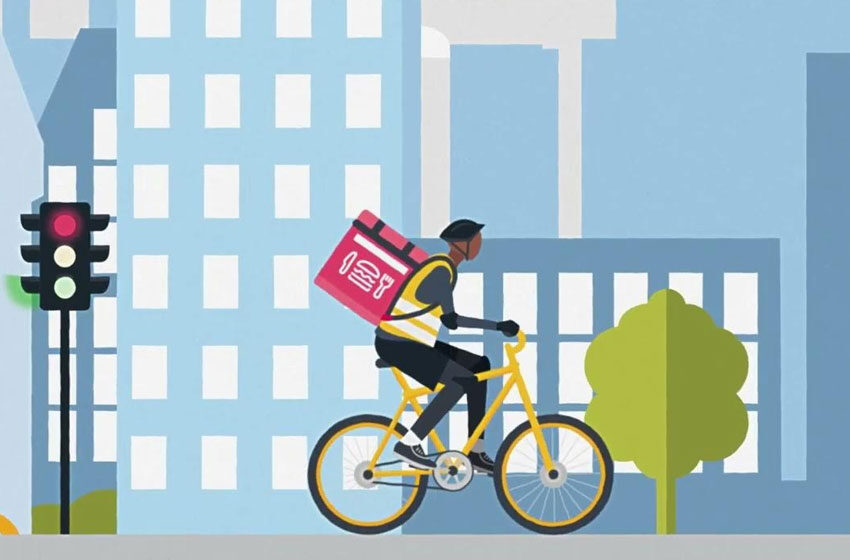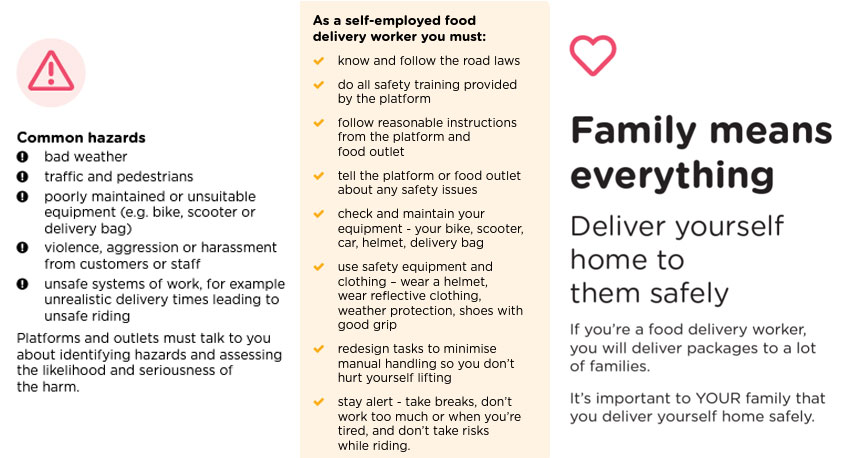Food delivery workers share what it means to deliver themselves home safely!

Food delivery workers are at risk of physical and psychological harm at work. Safe Work Australia data shows 10 food delivery workers have tragically died at work, since 2019. This has led to a genuine concern for work health and safety within the cohort, many of whom are migrant workers who may not necessarily have English as their first language.
To address this, Safe Work Australia recently launched the Deliver yourself home safely campaign to raise awareness of work health and safety amongst food delivery workers. The campaign provides practical work health and safety information, in seven languages to help influence positive work health and safety attitudes and behaviours.

The campaign, launched in May, has benefitted food delivery workers in diverse cultural and linguistic communities. Analysing the campaign’s local effects, a survey was conducted amongst food delivery workers within diverse cultural and linguistic communities to learn how the website has helped them in addressing their concerns and locating support.
This article shares the experiences of two of the campaign’s benefactors, that every food delivery worker can identify with – a young immigrant student named Kim Li (name changed) and a full-time food delivery worker named Manjeet Singh (name changed).
Student and part-time food delivery worker.
Kim Li is a 21-year-old Chinese student from Beijing, who came to Australia in 2022 to live her dream of settling abroad with an overseas education. She became a food delivery worker, as a transitional job, to help support her living costs, while she completed her education.
Sharing her story, Kim said, “Like all international students, I came to Australia with big, beautiful dreams. I came across food delivery work through a common friend from the University. It sounded fun and was a wonderful way to learn about the country and its people.”
She was not aware of the risks of physical and psychological harm that the job would bring with it.
“No doubt the job is fun, and I enjoy doing it. But there are situations that do scare me too. Like navigating through dark alleyways in the city and dealing with angry customers. I have experienced abuse so many times. Also riding in bad weather is dangerous, especially when it is raining.”
She was very happy to hear about the Deliver yourself home safely campaign and the information on being safe at work that the website provided.
“I read about the campaign on a Chinese news portal and started researching further. What I loved was that it had clear and concise information, in my language, that I could read and share with fellow food delivery workers from similar backgrounds. I learnt about practices that can keep me safe, workers’ compensation, my rights when dealing with abuse, and understanding that help was available if needed. I wish I had known this when I first started delivering food.”
“I am more confident on my job now and so is my family back home! I hope more food delivery workers read the website when they come into the job to keep them safe too,” she added.
Family man and full time in food delivery.
Another story that struck a chord was that of Manjeet Singh. Manjeet is an engineer from India, currently a citizen of Melbourne, Australia.
Recollecting how he started food delivery, Manjeet said, “I became a food delivery worker as a side hustle, while I was looking for a new job. Today, it is my full-time profession. Several times I thought of returning to my original career, but the flexibility just kept pulling me back to food delivery. My wife works in healthcare, so the food delivery allows me the flexibility to manage my 11-year-old while she is on duty.”
Manjeet who rides his motorbike for deliveries, feels that there are many challenges when working in food delivery industry.
“I took to riding within the city due to the parking issues across the CBD. But riding is not very safe, especially when you are navigating between restaurants and delivery locations, trying to make the most of the peak-hour rush, all while dealing with traffic, birds, harsh weather, and bumpy roads.”
Lunch and dinner times are the busiest work periods for Manjeet, with many orders to work through. This means that food delivery workers do not often get to have a break themselves in peak periods.
“You feel hungry, particularly with so much food around you. But, since the peak hour is limited, you must rush to make sure you can make the most of the demand.”
When asked about the Deliver yourself home safely campaign, Manjeet agreed that the campaign website has provided him with lots of important and practical information.
“A friend told me about the campaign. The website is helpful and contains a lot of valuable information. I was glad there was something available for us and someone had thought about our safety. I have always been an advocate for safety and encourage all my fellow food delivery workers to always wear their personal protective gear. I also urge them to check the website, follow the campaign and make the changes in safety behaviours and actions at work.”
Hearing the stories just reinforces the impact of the campaign on work health and safety for food delivery workers. Here’s hoping that Kim’s and Manjeet’s stories resonate with other food delivery workers and inspires them to think about work health and safety and make every ride a safe ride.
For more information visit www.swa.gov.au/deliversafely to make every ride a safe ride and deliver yourself home safely!







